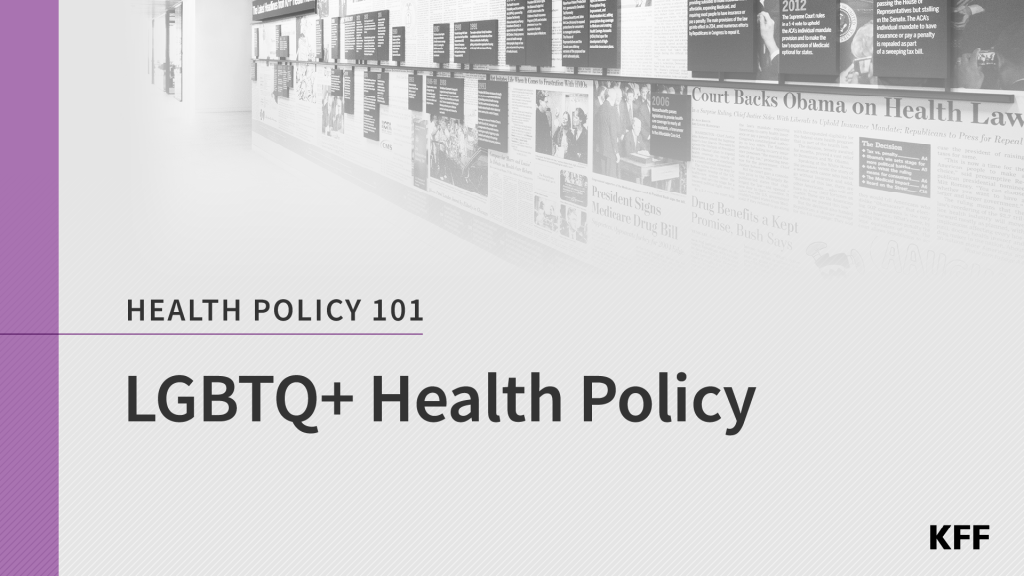
The independent source for health policy research, polling, and news.

VOLUME 8
Falsehoods About Transgender People and Gender Affirming Care
This is Irving Washington and Hagere Yilma. We direct KFF’s Health Misinformation and Trust Initiative and on behalf of all of our colleagues across KFF who work on misinformation and trust we are pleased to bring you this edition of our bi-weekly Monitor.
Summary
This volume explores politically motivated misinformation targeting gender-affirming care, transgender people, and its impact on online discourse, legislation, and health care access. We also examine Florida Surgeon General Ladapo’s recent misleading claims about mRNA vaccines and new technology that can predict if social media users will share disinformation.
Featured
KFF Publishes New Health Policy 101 Chapter On LGBTQ+ Health Policy

In the latest Health Policy 101 chapter, KFF explores factors that impact the health and well-being of LGBTQ+ people. The chapter includes a discussion of the role gender-affirming care plays in the lives of transgender and nonbinary people in the U.S. Gender-affirming care is a comprehensive approach to healthcare that can support transgender and nonbinary people in aligning their physical appearance and gender identity. Among transgender and nonbinary people who transition, many do so without any medical intervention (referred to as social transitioning), instead taking actions like changing their appearance, name, or pronouns to fit their gender identity. Among those who do seek medical care as a part of their transition, common types of gender-affirming care include puberty blockers, which are reversible and temporarily delay the onset of puberty to allow a young person time to make decisions about their gender identity, and hormone replacement therapy (HRT), which helps individuals develop physical traits that match their gender identity. Gender-affirming care can also include surgeries, but surgical interventions are relatively uncommon among adults and extremely rare among minors. Gender-affirming care is a medically necessary evidence-based system of care and supported by all major U.S. medical associations.
The effectiveness of gender-affirming care is well-documented, with numerous studies showing that it significantly improves mental health outcomes, as well as lead to better physical health outcomes by encouraging regular medical check-ups and preventive care. But the services used in gender-affirming care are not exclusive to transgender individuals; the very same services used in gender affirming care are commonly used in other medical interventions, including in minors. For example, puberty blockers might be used for a young person experiencing “precocious puberty” and hormone treatments are used to treat a wide range of conditions in young people and adults.
Polling Insights:
The KFF/Washington Post Trans Survey found that most trans adults (88%) say they have taken at least one action in transitioning, however many of these actions are non-medical. Most trans adults say they have changed their physical appearance, pronouns, or name during the process of transitioning, but smaller shares report using hormone treatments (31%) or undergoing gender-affirming surgery to change their physical appearance (16%).
KFF polling also shows that trans adults report significant issues accessing gender-affirming health care, including having experiences with doctors not providing appropriate care, having discriminatory encounters with providers, and facing issues with health insurance coverage. About three in ten trans adults say they have had to teach a doctor or other health care provider about trans people so they could get appropriate care (31%), had a doctor or other health care provider refuse to acknowledge their preferred gender identity and instead refer to their sex assigned at birth (31%), or been asked unnecessary or invasive questions about their gender identity unrelated to their visit (29%). About one in six (17%) trans adult say they have had a doctor or other health care provider refuse to provide them with gender-affirming treatment, such as hormone treatments.
Emerging Misinformation Narratives
Political Figures Falsely State Schools Are Performing Gender-Affirming Surgeries on Students

A new AP-NORC/USAFacts survey shows that the public thinks both presidential campaigns are generating messages based on misinformation, with about four in ten adults saying it is difficult to know if what candidates are saying is true or not when it comes to information about the upcoming election. One example is misinformation about gender-affirming care, which has increasingly been weaponized for political gain, with online sentiments echoing these false claims. For example, former President Donald Trump has continued to falsely claim that children are undergoing gender-affirming surgeries at school. Trump initially made this claim on August 30 at an event hosted by Moms of Liberty and repeated the claim on September 7 at a Wisconsin campaign rally, reigniting online debate about the ethics, safety, and necessity of gender-affirming care for youth. But fact checkers explain that schools do not provide medical care without parental consent. Gender-affirming surgeries for minors are also extremely rare and decisions around all gender affirming care involve a meticulous and lengthy process with minor, parental, and medical provider involvement.
Between August 30th and September 25, the claim was mentioned approximately 121,000 times in posts, articles, comments on articles. Most posts mocked or debunked the claim, noting that gender-affirming surgeries for minors are exceedingly rare and that children are not undergoing any kind of surgery at school. One X post, for example, that received approximately 2.8 million views, 147,000 likes, and 13,000 reposts as of September 26 joked, “My daughter just texted she’s opted in for the transgender surgery at the high school nurses office. She’s like 5th in line.”
Some Incorrectly Claim Identifying as Transgender is Temporary and That Gender-Affirming Care Is Experimental
Other online posts share the false claim that gender-affirming care is associated with high rates of regret, despite research showing that less than one percent of people who undergo gender-affirming surgery regret the decision. Between August 28 and September 25, this narrative was mentioned approximately 41,000 times in posts, articles, comments on articles. Many used the term “detransitioner” to describe formerly trans-identified people who return to identifying with their sex assigned at birth. One popular X post from September that received over a million views and 8,500 reposts read, “I'm a detransitioner and I am voting for Donald Trump. When I was 19 years old, doctors led me to believe that I was transgender. I was told that hormones and surgeries were my only options — they were wrong.” The author then accused Vice President Kamala Harris of “pushing” children into gender-affirming care. Some comments supported the author’s false claim about Harris, while others attempted to debunk the notion that gender-affirming care is harmful.
Some also falsely claim that it is experimental and lacks an evidence base. However, this is not accurate and similar treatments are readily accepted for cis-gender children. For instance, puberty blockers are frequently portrayed as dangerous and experimental when prescribed to transgender youth, despite their long-standing use in treating early puberty in any child without controversy. Such fallacies not only perpetuate misinformation but also contribute to the stigmatization and marginalization of transgender youth, denying them the same standard of care afforded to their cis-gender peers. The types of false claims that emerged following Trump’s comments suggest that the public needs further education about what gender-affirming care for youth is and what it is not and how access to gender-affirming care improves mental health outcomes in trans youth.
Recent Developments
Misinformation About Gender-Affirming Care Has Fueled Recent Legislation

Despite the scientific evidence supporting the provision of gender-affirming care, misinformation has led to policy restrictions on health care for transgender people in the U.S. The KFF Gender Affirming Care Policy Tracker reports that, at the time of publication, 26 states have enacted bans on gender-affirming care for minors and some limit this care for adults too. Many of these laws restricting health care for transgender people are being challenged in court as a violation of the 14th Amendment (and on other grounds), but misinformation continues to impact support for these bans. False claims often portray gender-affirming care as experimental and harmful, but all 26 laws have provisions that allow the same services used in gender-affirming care for other medical care. These measures exploit the general public’s limited understanding of transgender health to push a political agenda and prohibit medically necessary care.
Misleading Information in Amicus Briefs Could Influence Supreme Court's Review of Transgender Youth Healthcare Case

At the request of the Biden Administration, the Supreme Court will review a challenge against Tennessee’s law banning hormone therapy for transgender youth in U.S. v. Skrmetti. As the Court prepares for the hearing, false information is presented to the Court through amicus briefs. These briefs are meant to provide additional perspectives for the Court but can contain misleading information from non-credible sources. For example, some amicus briefs have used anecdotal or flawed evidence to claim that transgender identities are temporary or that gender-affirming care is experimental. Another source of misleading information is the Cass Review, a UK report that has been used to justify restrictions on gender-affirming care for minors in the U.S. The review, commissioned by the NHS, claimed there was "no good evidence" supporting the long-term outcomes of gender-affirming care, contradicting over 100 studies demonstrating its safety and efficacy. Although criticized as a biased review that applied unattainable standards not required in other areas of pediatric medicine, it has been cited in some amicus briefs submitted to the Court as evidence. On the other hand, amicus briefs supporting the challenge explain that the Cass Review does not offer any new evidence.
More to Watch: Florida Department of Health Shares False Information About mRNA Vaccines

On September 12, the Florida Department of Health issued updated guidance advising against the use of updated mRNA COVID-19 vaccines, contradicting federal and public health officials who recommend updated vaccines for everyone 6 months and older. The guidance falsely claimed that the mRNA vaccines pose health risks, a stance that has been refuted by the FDA before. Experts interviewed by KFF Health News believe Ladapo's guidance is politically motivated, aligning with Governor DeSantis's stance against public health mandates. Even with COVID-19 cases rising, medical professionals have been slow to counter this misinformation, possibly due to fear of political repercussions. Previous KFF polling has found that most adults have at least a fair amount of trust in the CDC (66%), the FDA (65%), and in their state and local public health officials (64%) to make the right recommendations when it comes to health issues. However, when state and federal public health officials offer contradicting recommendations, the public may be confused on how to proceed.
Within a day of the vaccine guidance announcement, 25,600 social media posts emerged, especially in anti-vaccine circles, spreading false claims about the risks of mRNA COVID-19 vaccines, including death, cancer, and blood clots. A top post on X from a doctor supporting the guidance garnered around 283,000 views,14,000 likes, 5,200 reposts by September 26. At the same time, posts debunking the Florida Department of Health’s claims also gained traction. One doctor’s thread criticizing the guidance as “antivaccine propaganda” and explaining the safety of mRNA vaccines received about 109,100 views, 2,900 likes, 840 reposts, and 20 comments, with most agreeing that Florida’s guidance was dangerous.
Research Insights
University Staff Training for Countering Misinformation

A study from 2020 explored the impact of a university staff development training designed to address misinformation and biases surrounding transgender people’s identities. The training emphasized the importance of challenging misinformation and fostering an inclusive environment, by committing to incorporating principles of equality, diversity, and inclusion into their work. Following the training, participants reported increased awareness of transphobic media coverage and became more confident in identifying and countering transphobic narratives. Staff who participated also felt better equipped to support transgender students and staff and contribute to wider institutional change that supports trans inclusivity.
Source: Krutkowski, S., Taylor-Harman, S., & Gupta, K. (2020). De-biasing on university campuses in the age of misinformation. Reference Services Review, 48(1), 113-128.
AI and Emerging Technologies
Machine Learning Algorithm Tries to Predict Future Disinformation Campaigns
A body of work demonstrates how machine learning can be used to detect existing fake news, but a group of researchers have developed a new machine learning algorithm that could potentially predict future malicious activity on social media. Their model aims to identify users who might spread disinformation or hate speech by tracking their behavior over time and comparing it to patterns seen in other malicious users. But even with these technological advances, the policy landscape for content moderation on social media remains unclear, raising questions about how such technology will be applied.
This edition was created in close collaboration with KFF’s LGBTQ Health Policy project. For more information, visit https://www.kff.org/lgbtq-health-policy/.
Support for the Health Information and Trust initiative is provided by the Robert Wood Johnson Foundation (RWJF). The views expressed do not necessarily reflect the views of RWJF and KFF maintains full editorial control over all of its policy analysis, polling, and journalism activities. The Public Good Projects (PGP) provides media monitoring data KFF uses in producing the Monitor.


